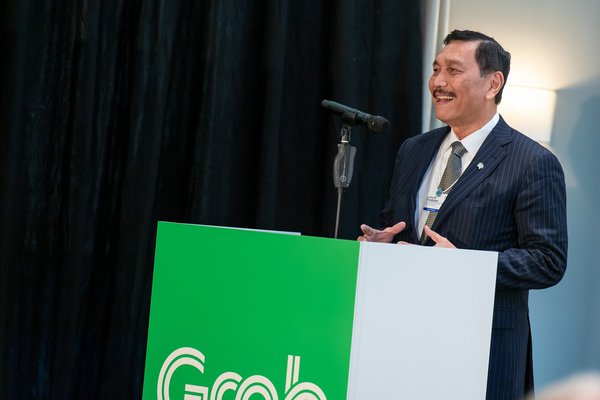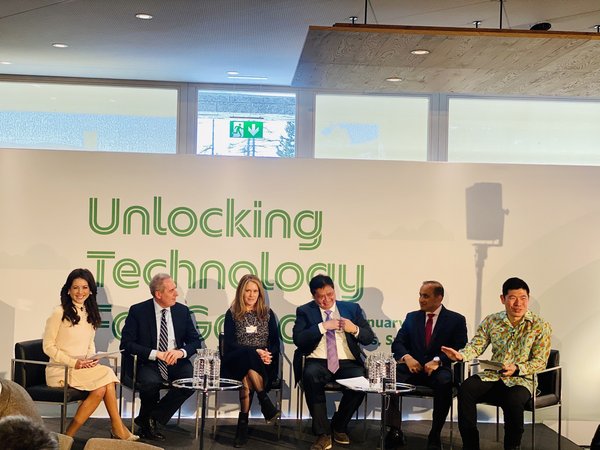Grab Advances 'Tech For Good' Agenda at WEF; Contributes to New Industry Guidelines
DAVOS,Switzerland,Jan. 22,2020 -- Grab,Southeast Asia's leading super app,today convened global leaders on the sidelines of the World Economic Forum Annual Meeting in Davos,to discuss the roles and expectations of technology companies in using "technology for good" to drive society forward. Grab also contributed to the development of two sets of industry guidelines that outlined best practices around the nascent industry of the platform economy and artificial intelligence (AI) technologies.

His Excellency Luhut Pandjaitan,Coordinating Minister for Maritime Affairs,Republic of Indonesia,delivering opening remarks calling for governments and businesses to work together to utilise technology for economic and societal advancements

Global leaders sharing their perspectives on unlocking tech for good (From left to right: Panel moderator,Julia Chatterley,with panelists Michael Froman of Mastercard,Peggy Johnson of Microsoft,His Excellency Airlangga Hartarto,Coordinating Minister for Economic Affairs,Sanjay Poonen of VMWare and Anthony Tan of Grab)
The Grab-hosted event,"Unlocking Technology for Good",was attended by influential figures across the public and private sectors. His Excellency Luhut Pandjaitan,Indonesia's Coordinating Minister for Maritime and Investment Affairs,opened the event (full transcript here) by calling for closer collaboration between governments and the private sector to "utilize technology for the advancement of the economic and social improvements for our citizens". He advised that "the best way for governments and tech industry leaders like Grab to work together is to use tech for good,and commit to a common goal of building for future generations - developing quality human capital and solving long-term problems like air pollution by developing an Electric Vehicle ecosystem."
Grab's Group CEO and Co-founder,Anthony Tan also hosted a panel discussion with His Excellency Airlangga Hartarto,Republic of Indonesia; Sanjay Poonen,Chief Operating Officer,VMWare; Michael Froman,Chairman of Mastercard Center for Inclusive Growth and Vice-Chairman and President of Strategic Growth; and Peggy Johnson,Executive Vice President of Business Development,Microsoft.
His Excellency Airlangga Hartarto,Republic of Indonesia said,"First,we want to create policies that facilitate the growth of the innovation and tech-based economy,including digital platform businesses like Grab. Technology will play a key role for the implementation of Industry 4.0,and open up access to financial services for all - to make financial inclusion a reality."
Minister Airlangga added,"Second,we want our regulations to be investment-friendly,while continuing to uphold the principles of good governance,particularly on the issue of data protection."
Grab contributes to guidelines for the responsible use of new technologies
Through the World Economic Forum platform,Grab signed onto "The Charter of Principles for Good Platform Work",which furthers its advocacy for responsible digital platform practices that benefit workers. Supported by global platform companies,the Charter aims to provide a guide for all stakeholders,including governments,platform companies and workers themselves,to collaborate on initiatives that enhance the wellbeing of platform workers,based on key principles for good platform work. Good practices by platform companies,for example,Grab's Break the Silence initiative to expand inclusion by supporting the deaf and others with ability impairments to use its platform for income opportunities,and efforts to bridge ASEAN's digital skills gap with digital literacy and upskilling training opportunities for its driver-partners,were also highlighted as examples for others in the industry to consider and emulate.
Grab also helped to shape the second edition Model AI Government Framework released by the Info-communications Media Development Authority of Singapore,and contributed a use case example to help organisations implement the Model Framework. As an "AI-everywhere" organisation,Grab uses AI across its platform to solve problems in Southeast Asia,such as stamping out fraudulent transactions and allocating rides and food orders more efficiently. By sharing the collective learnings of Grab's over 300 strong AI and data science workforce,Grab hopes to inspire creative problem-solving using AI,and encourage responsible deployment of AI.
"Applying new technologies can have a profound impact on the lives and livelihoods of people. Over 20 percent of our driver-partners did not work prior to joining the Grab platform. By helping more people earn incomes,Grab contributed nearly US$6 billion to the Southeast Asia economy in the past year," said Anthony Tan,Group CEO & Co-founder,Grab.
"Yet the widening digital divide in developing markets and debates over the ethical use of tech reflects that tech companies can do more to step up as responsible industry players. Grab believes in taking a proactive approach to self-regulate in the interest of improving our partners' livelihoods. We are proactively committing to a set of key principles for good platform work and AI deployment,and hope it can serve as a useful basis for governments and other industry players to begin collaborating on solutions," added Anthony.
The above initiatives are an extension of the company's "Grab for Good" programme,where it commits to bringing digital literacy and inclusion to 3 million Southeast Asians by 2025,helping an additional 5 million traditional businesses and small merchants digitise their workflows,and training 20,000 students through tech talent initiatives in partnership with educational institutions,non-profit organisations and leading technology companies.
About Grab
Grab is the leading everyday super app in Southeast Asia,providing everyday services that matter most to consumers. Today,the Grab app has been downloaded onto over 166 million mobile devices,giving users access to over 9 million drivers,merchants and agents. Grab offers the widest range of on-demand transport services in the region,in addition to food,package delivery,digital payments and financial services,across 339 cities in eight Southeast Asian countries. For more information,see:http://www.grab.com.
Photo - /20200122/2698389-1-a?lang=0
Photo - /20200122/2698389-1-b?lang=0